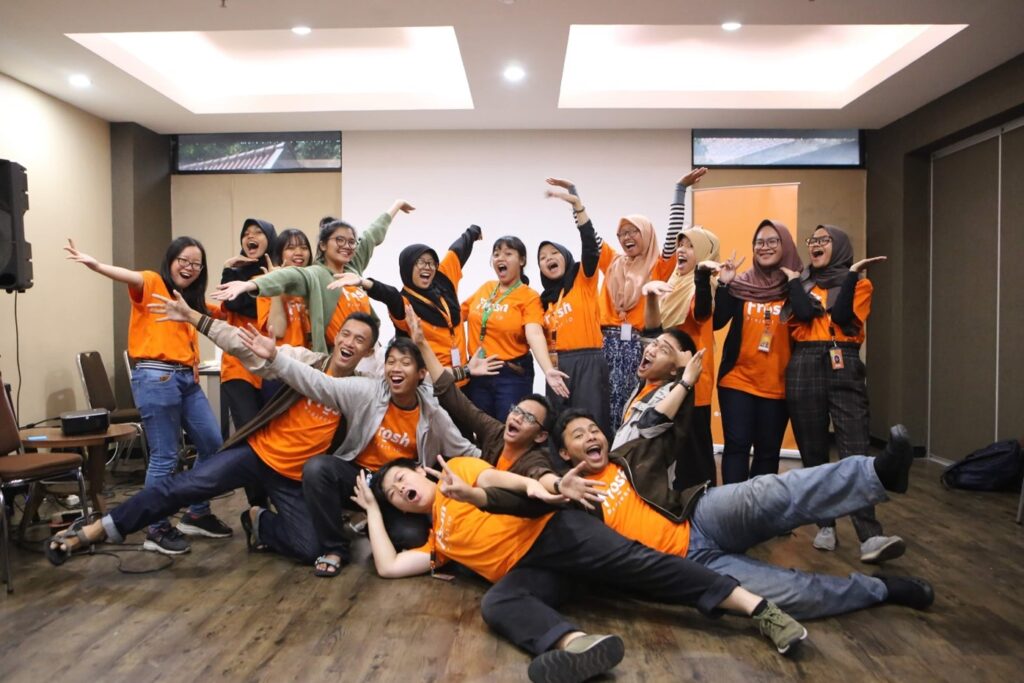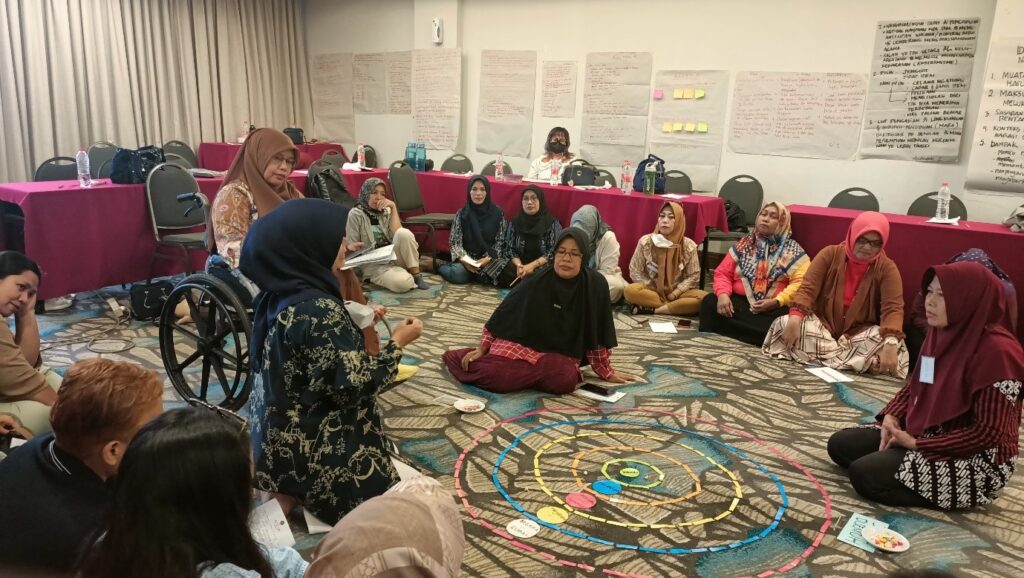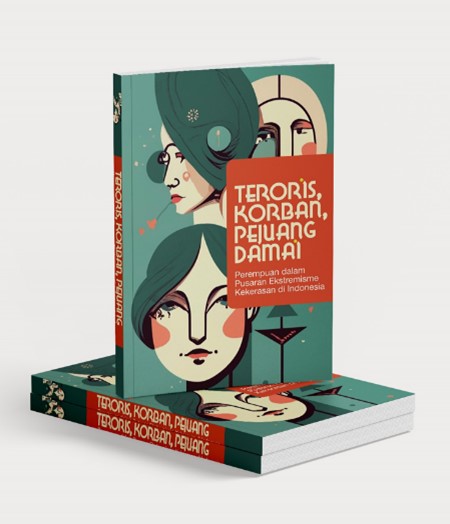From Jordan and Sri Lanka to Indonesia, our projects are investing in women by supporting gender equality initiatives and the feminist changemakers working tirelessly to tackle women’s poverty and inequality and advance their human rights.
Read on to learn how our teams are bolstering women’s leadership capacities, addressing sexual and gender-based violence, countering violent extremism and recognizing women’s roles as peacebuilders in their communities.
Investing in Young Women in Leading Peace and Women’s Rights
In Indonesia, many young women struggle to position themselves to play a leadership role in their organizations, including those that work to spread peace. When women are in positions of leadership, their presence encourages the establishment of safeguarding protocols and standard operation procedures to promote gender equality and women’s human rights.
Through the USAID-funded Harmoni project, we facilitate leadership capacity strengthening for young women via Peace Generation (PeaceGen), a local organization working on youth and peace issues. PeaceGen promotes women to become program managers and opens networking opportunities for young women peace builders at both national and international levels. PeaceGen also worked with the Task Force for Handling and Preventing Sexual Violence at the Universitas Pendidikan Indonesia (Indonesian University of Education) in Bandung to integrate gender-sensitive and positive media promotions to address radicalism and extremism among university students in Indonesia.
In addition, PeaceGen trained 55 university women to become Agents of Peace in countering radical narratives and promoting tolerance and resilience. These Agents of Peace had a multiplier effect, leading to the training and mentoring of more than 900 students, including 627 women.

Elevating Female Judges to Lead Jordan’s Courts
In Jordan, complex political and economic factors, including high unemployment, poor communication by the government, and a weak judiciary, have created a tense citizen-state dynamic. The USAID-funded Public Accountability and Justice Strengthening Activity (PAJ) collaborated with the Judicial Institute of Jordan (JIJ) to develop and deliver the Diploma Leadership Training for Judges program to enhance the skills of judicial leaders and foster greater trust in the justice system.
To date, 72 judges, including 19 women, have completed the comprehensive training that spans 162 hours and imparts leadership skills such as effective communication, case management, ethics, professionalism, and managing diversity. The program is already producing impactful results. Participants report a significant improvement in job performance; equipped with new skills and strategies, these judges are resolving challenging situations with greater ease and confidence, managing courtrooms more efficiently, and using improved decision-making processes. Moreover, the program has had a powerful impact on empowering female judges. Participants have shared how the training broke down gender-related barriers and instilled greater confidence to lead courtrooms and staff.
Recognizing the benefits of the leadership program, the Chief Justice recently appointed six course graduates, including two female judges, as heads of courts of first instance. New court leader, Judge Kefah Al-Droobi, emphasized the program’s inclusivity, noting that “judges were empowered to take on leadership roles, leading to a significant increase in the number of female judges appointed as court heads after the training.”
Supporting a Feminist Organization to Prevent Violent Extremism
Extremist organizations in Indonesia have begun recruiting women for fundraising, bombing, and social media campaigns. Women-led organizations have lost many members due to this recruitment.
Last year, through USAID’s Harmoni project, we collaborated with the Indonesian Women’s Coalition for Justice and Democracy (Koalisi Perempuan Indonesia/KPI), the largest membership-based feminist organization in Indonesia, to facilitate capacity building for feminist campaigners and increase their understanding of extremist ideologies, their operation in Indonesia, and their impact on women and girls. Sixty feminist campaigners from six provinces have disseminated counter-extremist ideologies within their communities, enriching the discourse for peaceful elections in Indonesia this year.

Addressing Sexual and Gender-based Violence in Sri Lanka
According to the Sri Lanka National Survey on Violence against Women, 1 in 4 women have experienced physical and/or sexual violence since age 15 by a partner or non-partner, and 2 in 5 women have experienced physical, sexual, emotional and/or economic violence and/or controlling behaviors by a partner in their lifetime.
For more than 10 years, MSI has partnered with USAID in Sri Lanka to strengthen civil society organizations and support local women’s networks in preventing and responding to sexual and gender-based violence (SGBV). Through the USAID-funded Sri Lanka Increased Demand and Engagement for Accountability (IDEA) project, we work to strengthen, sustain, and empower civil society organizations by issuing grants and providing capacity-building, training, and support to grantees responding to the issues of gender inequality and violence against women. More than 50% of IDEA’s grant portfolio has been awarded to organizations that either specifically focus on securing women’s rights and improving their status or include an SGBV component.
IDEA’s efforts over the last several years have made a significant impact. More than 5,400 individuals have received SGBV services, including emergency assistance, legal support and counsel, psychosocial support, and assistance to access courts dealing with personal laws. IDEA, through its grantees, has also made safe shelters and crisis center facilities available for affected women and girls. In addition, more than 3,000 people have been trained to advance gender equality or women’s empowerment outcomes. Twenty grantees, from the grassroots to the district level, have mobilized more than 80 government and civil society joint forums to address SGBV in their localities. Check out this infographic to learn more.
Acknowledging the Role of Local Women Peace Builders
The role of women in peacebuilding is often overlooked and neglected within their communities. To popularize the stories of women who are building peace and countering violent extremism, the Harmoni project supported the Working Group on Women Countering Violent Extremism (WGWC) in its effort to document and distribute a book of case studies and untold stories detailing women’s resilience and leadership in preventing and countering violent extremism.
The book portrays the experiences of 14 women who have dedicated themselves to preventing the spread of radicalism and violent extremism in their communities by prioritizing gender equality, inclusiveness, and non-violence paradigms. Some, who were previously victims and survivors, are now community organizers and advocates, assisting convicted former terrorists and their families, returnees, and deportees readjust to life in their communities. Five hundred copies of the book have been printed and disseminated across five provinces in Indonesia, with plans for online publication on the WGWC Website soon.
